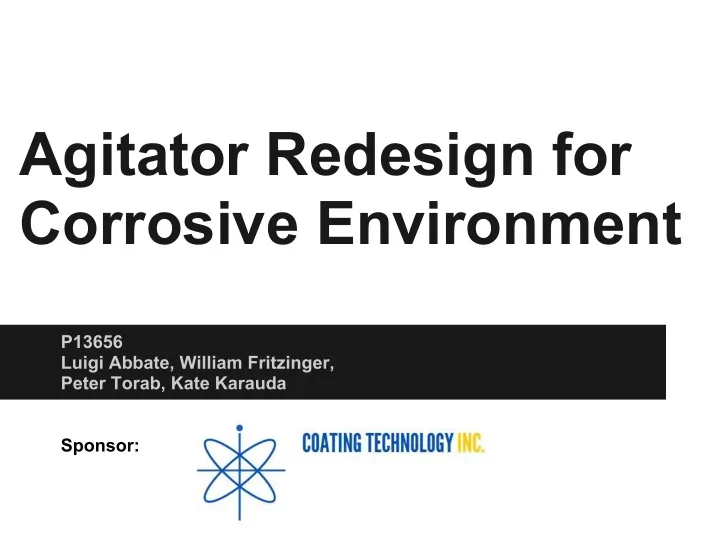

Agitator Redesign for Corrosive Environment P13656 Luigi Abbate, William Fritzinger, Peter Torab, Kate Karauda Sponsor:
Project Description The goal of this project is to select, optimize, and implement and off-the-shelf ultrasonic cleaning unit to replace a mechanical agitation system at Coating Technology Inc. The new system will significantly reduce the time required to complete a coating removal process, and will be more reliable than a mechanical agitator. Our team will determine the optimal operating conditions for the unit prior to its implementation.
Customer Specifications
Customer Specifications
System Information ● Current mechanical agitation system:
System Information ● Design is prone to mechanical failure and vulnerable to corrosion
System Information ● Ultrasonic cleaning was selected ○ Increase coating removal rate ○ No moving parts ○ No components are exposed to vapors ○ No maintenance necessary ○ Reduce risk of damage to expensive dies ○ Same unit can be used for many other processes
System Information ● SevereClean SC-11 Ultrasonic Cleaner
Testing Performed ● Variable testing ● Validation testing ● Solution conductivity & absorbance ● Residual coating testing ● Peroxide titration testing
Variable Testing ● Performed at different starting temperatures ● Samples were submerged for 1.5-6 hours ● Used CTI hydrogen peroxide solution ● Coating removal was visible
Increase in Temp Increase in Time
Surface Coating Removal ● 1” x 1” 304 SS test tabs (x20) ● 6μm TiCN coating Group Samples Power Level Set Temperature 1 1-4 50% 100F 2 5-8 50% 140F 3 9-12 100% 100F 4 13-16 100% 140F 5 (Control) 17-20 0% (SONICS OFF) 140F
Surface Coating Removal ● The unit was tested at the 50% power setting to determine if a lower setting could be effective
Surface Coating Removal ● Removal rate significantly increased at 100% power ● 140F is the optimal bath temperature
Surface Coating Removal ● At optimum conditions, the addition of sonics provides a significant increase in removal rate
Mock Die Coating Removal ● 1”x1”x2” 316 SS bar stock (x4) ● Nine 1/2” deep, 1/16” ID blind holes ● 6μm TiCN coating Samples Orientation Power Level Set Temperature 21 holes down 100% 140F 22 holes to the side 100% 140F 23 holes up 100% 140F 24 holes down 0% 140F
Mock Die Coating Removal Starting Point:
Mock Die Coating Removal Setup:
Mock Die Coating Removal 60 Minutes: Side Down Still Up
Mock Die Coating Removal 90 Minutes: Side Down Still Up
Mock Die Coating Removal
Mock Die Coating Removal Conclusion: ● Mass does not appear to affect surface coating removal rate ● Sonics are powerful enough to clean inside blind holes Concerns: ● Hole diameter very large compared to dies ● Mass is much lower than dies
Recommendations ● Heating - Cooling Unit: ○ Used to maintain constant temperature in the unit ○ Prevents from overheating ● Indirect Method: ○ Tank filled with water ○ Glass container with peroxide solution submerged in the tank ○ Parts submerged in the glass container ○ Saves solution & prevents the corrosive effects of the bath on the tank
Project Evaluation ● Successful implementation of the ultrasonic unit ● Testing yielded expected results ● Successful removal of the coating from various test specimens ● Determined optimal operating conditions: ○ Temperature ○ Ultrasonic power
Future Steps ● Test the cleaner on dies or mock dies ○ Determine cleaning performance in small through holes ○ Determine effects of increased object mass ● Test rate of removal of base material ○ No measurable results in our testing
Recommend
More recommend